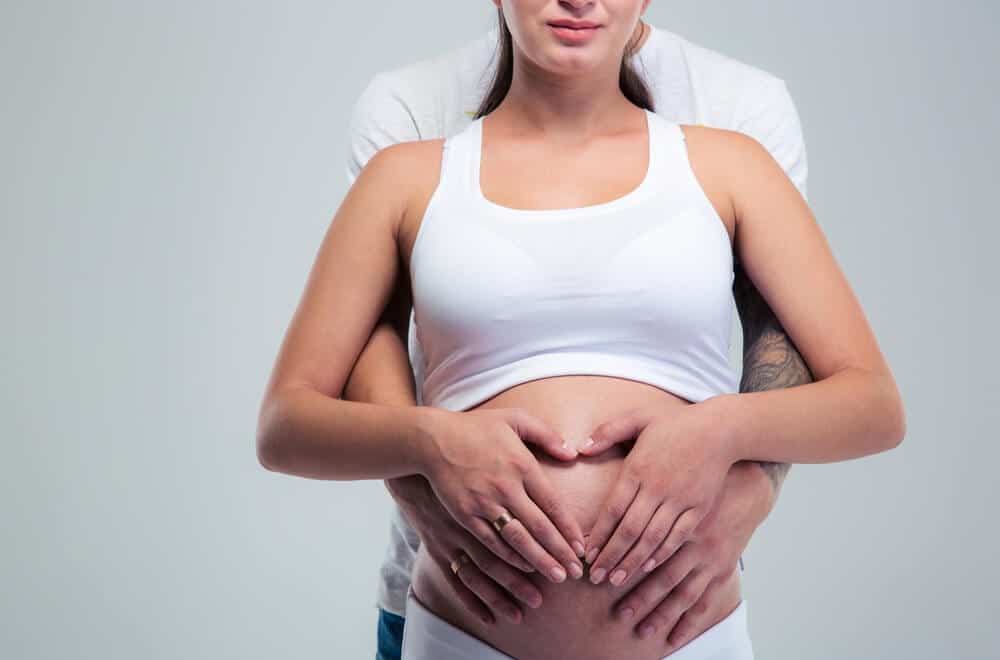
For anyone suffering from eating disorders, pregnancy can be a troubling time for a wide variety of reasons. The body goes through a lot of changes in those nine months and knowing what to expect and getting the right help to cope with those changes is essential.
Pregnancy is a time in a woman’s life which is truly miraculous, however many pregnant women feel very vulnerable and can struggle to come to terms with the physical and mental changes that occur during this period. For those who have previously struggled with eating disorders or those who are currently living with one, it can be even more difficult to adjust to the emotional upheavals that they go through at this time of their life.
While many women feel an overwhelming love for their unborn baby, they may still experience apprehension and fear, both for their child and for themselves. When these feelings are complicated by the presence of an eating disorder, it’s no wonder that nine months of turbulence can follow.
Pregnancy And Its Emotional Upheaval
Millions of women struggle with mental illnesses, and it isn’t uncommon for many of them to develop eating disorders like binge eating disorder, bulimia or anorexia during their childbearing years.
While those who have never been pregnant often think of it as a wonderful and joyful time, in fact, there are many aspects that are frightening for any woman. Undergoing biological changes combined with gaining weight can make even women without an eating disorder feel as if they are losing grip on themselves.
However, for those who have an eating disorder, those fears may be exacerbated to whole new levels as they struggle against a condition that is now not only putting their own life at risk but also that of their unborn baby.
There is no single predictable outcome for pregnant women who have current or previous eating disorders. For some, their problem continues unchanged throughout their pregnancy. For others who are in recovery, their pregnancy may trigger them to relapse, either in the anti-natal or post-partum period. For some, however, pregnancy becomes a time when they feel greater motivation to recover.
Eating Disorders Putting The Unborn Baby In Danger
From the moment of conception right up to delivery, every day of the baby’s development process is vital. The choices made by the mother directly affects the unborn child, and this is something that any pregnant woman with an eating disorder needs to bear in mind when considering the challenges they will face over those nine months so that they can achieve the best outcome for their baby and for themselves.
Each stage of the pregnancy can present its own unique challenges:
- The first trimester – when you learn that you’re pregnant, you’ll probably feel excited but also have feelings of trepidation. Your body will start to go through changes in these first 12 weeks and those changes often generate unpleasant symptoms like mood swings, extreme fatigue, food aversions or cravings, morning sickness and weight gain. For any woman with an eating disorder, it’s vital to seek medical advice at this early stage to ensure the most appropriate prenatal care is offered. You may need to have extra check-ups, more therapy or intensive outpatient care. For some women, the first twelve weeks can be plagued with vomiting, nausea or food aversions that make it hard to consume adequate nutrition. Therefore, arranging to see a nutritionist could be a good idea at this stage to ensure you’re eating enough to support yourself and your growing baby.
- The second trimester – during this stage, the fatigue and nausea of early pregnancy usually subside, however these changes are replaced by others as the baby grows bigger. You’ll start to notice that your stomach is growing to accommodate the growing fetus, and stretch marks as well as skin texture and color changes often occur. While all of this is completely normal, it can cause emotional upheaval for those with eating disorders.
- The third trimester – between weeks 29 and 40, your body will go through even more extreme changes. You’ll become physically uncomfortable as the baby puts increasing pressure on the internal organs and this can cause digestive issues that can be problematic for women with eating disorders. It can be all-too-easy to use those discomforts as a valid reason for restricting food intake or engaging in disordered eating behaviors. It’s therefore important to continue attending regular appointments with a nutritionist, midwife and doctor to prevent the possibility of pre-term labor or harm to your growing baby.
Coping With Weight Gain is Difficult For People With Eating Disorders
Weight gain is one of the biggest problems associated with pregnancy for many women, however for those with eating disorders, it can be especially difficult to cope with. Gaining weight during pregnancy is completely natural, but it can be very upsetting, particularly if poor self-esteem and negative body image was a problem before getting pregnant.
It’s important to try to remember that a healthy amount of weight gain is essential to support a growing baby. It’s recommended by the ACOG (American College of Obstetricians and Gynecologists) that pregnant women gain around 25-35 lbs during the course of their pregnancy. However, this can be very distressing to any woman struggling with an eating disorder.
If you find that gaining weight is too overwhelming during pregnancy, it’s vital to seek professional support. You may find it helpful to ask your doctor not to show you your weight when you go to your check-up appointments and to avoid directly discussing your weight with you.
Another major problem is that family and friends may unthinkingly make comments about how big you’re getting, and this can be especially hurtful and distressing, resulting in a relapse or an exacerbation of disordered eating behaviors. Try talking to a therapist or counselor about those comments or even raise the way you’re feeling with your loved ones. If you allow those emotions to build up without expressing them, unhealthy coping mechanisms could manifest themselves which could harm you or your baby.
The Risks Of Eating Disorders During Pregnancy
Pregnancy is never risk-free, however for those with eating disorders there are a number of higher risks. These include:
- A greater chance of needing a cesarean section
- A higher risk of delivering pre-term
- A higher risk of delivering a low birth-weight baby
- A greater chance of developing depression in the post-partum period
Some of the other complications associated with eating disorders during pregnancy include:
- Poor nutrition
- Cardiac irregularities
- Dehydration
- Gestational diabetes
- Depression
- Complications during labor
- Poor development of the fetus
- Respiratory distress in the baby after birth
- Feeding difficulties
Luckily, research has recently shown that those women with eating disorders who get the right prenatal care to enable them to keep their condition under control go on to have a healthy, normal pregnancy and deliver a healthy, normal baby.
What Do I Do If I Have An Eating Disorder And Find Out I’m Pregnant?
The first thing to do if you have an eating disorder and find out that you’re pregnant is to arrange an early appointment with your doctor or midwife to discuss your problem. Not only should you talk about your physical health concerns, you must also tell your health professional about any medication you’re taking for your mental health. Some medications for mental health issues are risky during pregnancy or while breastfeeding, and your doctor will be best placed to give you information or adjust your medication during your pregnancy. Your doctor may also be able to offer you different treatment options like talking therapies or guided self-help. It’s important, though, not to stop your medication until you’ve spoken to your doctor since withdrawal symptoms could kick in or your condition could worsen.
What Kind Of Treatment Can I Get For My Eating Disorder During Pregnancy?
During pregnancy, your doctor or midwife should be able to give you expert advice about how to manage your symptoms and what to expect during the course of your pregnancy. They should be able to offer you information about healthy eating so you can maintain a healthy weight through the nine months. You may also benefit from participating in talking therapies of CBT with a professional counselor to learn how to better manage your weight, food and body image issues at this challenging time.
You may benefit from attending a support group both during your pregnancy and afterwards as this will give you a forum in which to discuss your fears and concerns in a supportive environment. Classes about childbirth, pregnancy, parenting skills and child development may also be empowering during your pregnancy, helping you to feel better prepared for this stage in your life so that you don’t feel quite so stressed and overwhelmed.
Although prenatal exercise classes may be helpful in keeping you physically healthy during your pregnancy, you should always discuss it with your doctor first to ensure it fits with your plan for recovery. You shouldn’t undertake too rigorous an exercise regime while you’re pregnant, although gentle exercise like swimming and yoga is often recommended.
Once your baby has been born, you still need to continue receiving professional support. Many women find that their eating disorder worsens after birth, even if their symptoms improved during pregnancy. Women with eating disorders also have a higher risk of postnatal depression, so knowing how to spot the signs is important. You should see your doctor within the first couple of weeks after the birth of your baby so you can arrange for ongoing care if necessary.
One of the most important things you can do is to put a support network in place. Talking to your friends and family about ways in which they can help you to stay well during your pregnancy and after the birth will give you greater control. They may also be able to offer you practical help by cooking you healthy meals, looking after your newborn for a while so that you can sleep or take some time out for yourself, or by carrying out household chores like laundry or cleaning so you can rest. This will help to reduce the extra stress on you so you can focus on your health and wellness.
Can Pregnancy Actually Help Eating Disorders?
Although eating disorders present numerous challenges during pregnancy, for some women, it provides the extra motivation they need to overcome their condition.
Pregnancy is a time in a woman’s life which naturally encourages better self-care, and this often gives sufferers the impetus they need to seek out help and to get the extra support they need to enter recovery.

If you’re pregnant and struggling with an eating disorder, here are some tips to help you maintain a healthy body image as you work towards getting better and managing your disorder:
- Be aware of pregnancy triggers – during the nine months of pregnancy, a lot of comparing, counting and measuring goes on and this can tap into the vulnerabilities which are associated with eating disorders. Feeling that you’ve lost control over your own body is very common during pregnancy, and childhood memories as well as feelings of isolation often come to the surface. It’s therefore important to see out the right support during your pregnancy so you can weather the storms without making your condition worse.
- Resist the temptation to close off – you needn’t be embarrassed or ashamed to ask for help. You aren’t a bad mother if you seek out support, and in fact, it’s a courageous thing to do for both yourself and your unborn baby. Recovery is a process which will help you to reach your potential as a parent and as an individual.
- Break the body hatred cycle – try not to hate your changing body. Instead, try to celebrate the miraculous nature of your body and the magic it is working to grow a new human being. Before you start to focus on stretch marks or loose skin, think about what you’ll say to your child about learning to love themselves. Think about how you’ll show them through your actions and words that the human body should be appreciated. You have that power within yourself to prevent your child from developing an eating disorder, so start with yourself and begin putting a greater value on yourself than just your physical appearance.
Although pregnancy can be a challenging time for women with eating disorders, it can also be a positive time of change where you can seek out extra support and enter recovery.
If you’ve just found out that you’re having a baby, make sure to check in with your doctor as soon as possible and get all the help you need so you can enjoy a healthy pregnancy and delivery.
If you’re looking for eating disorder treatment at an outpatient facility, look no further than The Meadowglade. We’re a facility with a solid reputation for treating eating disorders and helping people develop healthy coping mechanisms and better relationships with food.
